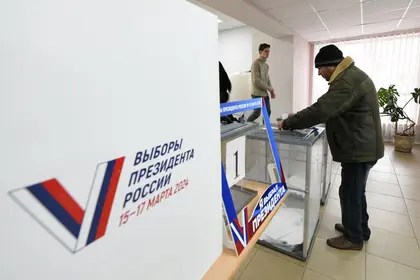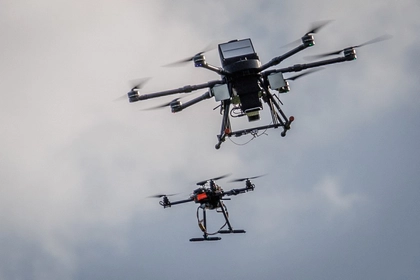Russia's three-day presidential election begins today, Friday. In addition to Vladimir Putin there are three representatives of parties with seats in the Duma on the ballot, all of whom, however, generally support his policies. The vote will take place in the absence of both opposition candidates and independent international observers. Commentators discuss the election and how democratic Europe should respond.
Putin votes
JOIN US ON TELEGRAM
Follow our coverage of the war on the @Kyivpost_official.
The important decisions in Russia are not made by the voters, says Politiken:
“In Russia has been at war in 19 of the 24 years since Putin has been clinging to power. He has decided to implement constitutional amendments to increase his own power. He has decided that it must be dangerous to challenge him. He has decided to silence the media. He has decided to whitewash Stalin and recycle his draconian repression. Of course there are elections in Russia. Putin votes. The world must take him seriously as the ruler of Russia. But Putin's election will never be democratic and legitimate.”
The tsar is naked
The elections in Russia are so obviously a farce that they no longer even serve as a fig leaf for the autocracy, Postimees writes:
“There's a well-known saying: 'If it looks like a duck, swims like a duck, and quacks like a duck, it must be a duck'. But this is not always the case. ... Undemocratic regimes often adorn themselves with the fig leaf of democratic mechanisms in order to be seen as equal. Sometimes - and regrettably often - the world falls into the duck trap. But the tsar of Moscow is naked, and no one in the world takes the presidential elections in Russia seriously. ... Once they were a fig leaf for the autocracy, but now the fig leaf is no more than a withered root.”

Russia Tries to Sabotage Moldova’s European Ambitions as It Did for Georgia and Belarus
At gunpoint
Blogger Denys Kazansky criticises the fact that voting in the Russian presidential elections is also taking place in the occupied territories of Ukraine. He writes in gazeta.ua:
“Russian media have shown how the so-called 'election' of the Russian president is being conducted in the occupied city of Sievierodonetsk. The footage shows armed and masked occupiers visiting pensioners in their homes and asking them to tick boxes for Vladimir Putin. Propagandists present these videos in all seriousness as proof of the legitimacy of the election and of the high level of support for Putin in the occupied territories of Ukraine. But in reality, they're just a visualisation of the expression 'elections at gunpoint'.”
Support Ukraine - also for the Other Russia
Timothy Garton Ash writes in Eesti Päevaleht:
“Russian voters have no genuine choice this weekend, since Putin has killed his most formidable opponent, Alexei Navalny, and ordered the disqualification of any other candidate who presented even a small chance of genuine competition. ... Yet these past few weeks have shown us that there's still an Other Russia. ... Tens of thousands of Russians of all ages and classes took the risk of subsequent reprisals in order to pay tribute to Navalny. At his funeral they chanted 'Navalny! Navalny!', 'Stop the war!' and 'Ukrainians are good people!' ... Enabling Ukraine to win this war is also the best thing we can do to improve the long-term chances for a better Russia.”
Don't recognise this gangster regime
Navalny's widow Yulia has called on the West to refuse to recognise Putin's foreseeable election because Russia is not a democracy but run by a "gangster". Ukraine-based Russian surgeon Andrey Volna backs her on Facebook:
“The only decent political outcome of this show could be the refusal to recognise this 'event' as an election, followed by the non-recognition of Putin's legitimacy. In other words, non-recognition by the 'collective West', leading to the gradual infiltration of the idea that 'the tsar is not real' in those segments of Russian society on which something could still depend - at least in the future. This is a lengthy process. But unfortunately it's the only time frame we have.”
Four good reasons to vote for Davankov
Writing on Facebook, journalist Asya Kazantseva says candidate Vladislav Davankov is still the best choice:
“Firstly, he is as much against the war as it is possible to be for someone running for election. Before the war he said, according to Wikipedia, that war was detrimental to Russia. Now on his campaign website he also advocates peace and negotiations (on Russia's terms - but what else can you say in his position). Secondly, on his campaign website he proposes not prosecuting those who have left Russia and want to return (like myself, for example). ... Thirdly, he has signed in favour of [allowing opposition politician] Nadezhdin to stand for election. Fourthly, he is 40 years old. ... He didn't grow up in the Soviet Union.”
No support for this system
Chemistry professor Boris Zhuikov calls on Russians on Facebook not to vote for Putin or any of the three authorised presidential candidates:
“The problem is that it is impossible to replace this leader because the system imposes vertical subordination to him, not only by the Central Election Commission but also by the judiciary, the State Duma including its 'opposition', the major media, the regions and the government. ... A fundamentally different system would require the separation of powers as well as checks and balances. ... The alternative is - sooner or later - only a collapse under the weight of internal and external contradictions. That is why one should never vote for anyone who supports this system.”
Serious doubts about voting secrecy
Keskisuomalainen fears that the persecution of members of the opposition will intensify after the elections:
“The Kremlin is concerned about voter turnout, although the power apparatus can manipulate this too of course, since election observers are not permitted. ... According to the authorities, the introduction of electronic voting in many regions will make it easier for people to vote. However many believe that in fact it will only make it easier for the government to control people and violate ballot secrecy. After the elections we will see how Putin punishes those who pose a threat to his power, such as the Nadezhdin supporters on the lists of names.”
Stalin nostalgia is palpable
Putin ensures his popularity through wars, Hvg observes:
“Stalin's popularity grew in Russia because under his rule the Soviet Union played an important role in the victory over Nazi Germany, became a global empire and had the countries of Eastern and Central Europe under its control. Support for Putin is also largely based on successful wars. Every time President or Prime Minister Putin's popularity starts to wane due to internal economic problems, a war comes along - in Georgia in 2008, in Ukraine in 2014 and 2022 - and the majority of Russian voters, who are nostalgic for the empire, forgive the ruler in the Kremlin.”
You can also highlight the text and press Ctrl + Enter






